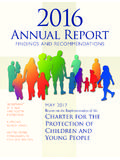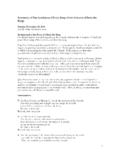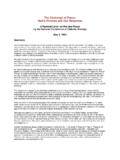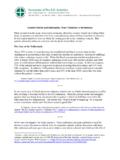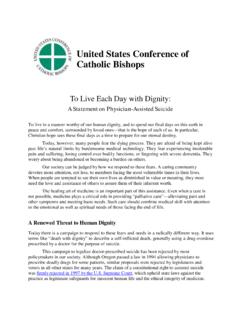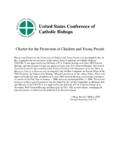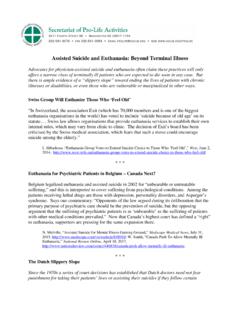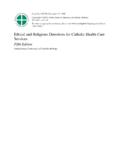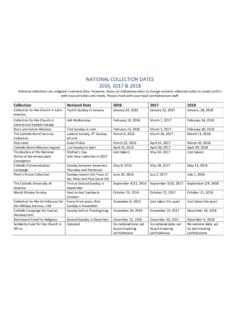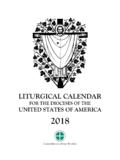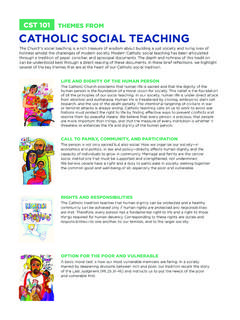Transcription of The Challenge of Forming Consciences for Faithful Citizenship
1 Part II of II: making moral Choices and applying Our PrinciplesThis brief document is Part II of a summary of the US bishops reflection, Forming Consciences for Faithful Citizenship , which complements the teaching of bishops in dioceses and I of the summary of the US bishops reflection, Forming Consciences for Faithful Citizenship , considered the core prin-ciples that underlie Catholic engagement in the political realm. Part II is a consideration of the process by which these principles are applied to the act of voting and taking positions on policy issues.
2 It begins with the general consideration of the nature of conscience and the role of prudence. The appli-cation of prudential judgment does not mean that all choices are equally valid or that the bishops guidance and that of other church leaders is just another political opinion or policy preference among many others. Rather, Catholics are urged to listen carefully to the Church s teachers when they apply Catholic social teaching to specific proposals and Does the Church Help the Catholic Faithful to Speak About Political and Social Questions?
3 A Well-Formed ConscienceThe Church equips its members to address political questions by helping them develop well-formed Consciences . Con-science is a judgment of reason whereby the human person recognizes the moral quality of a concrete act.. [Every person] is obliged to follow faithfully what he [or she] knows to be just and right (Catechism of the Catholic Church, no. 1778). We Catholics have a lifelong obligation to form our Consciences in accord with human reason, enlightened by the teaching of Christ as it comes to us through the Church.
4 The Virtue of Prudence The Church also encourages Catholics to develop the virtue of prudence, which enables us to discern our true good in every circumstance and to choose the right means of achiev-ing it (Catechism of the Catholic Church, no. 1806). Prudence shapes and informs our ability to deliberate over available alternatives, to determine what is most fitting to a specific context, and to act. Prudence must be accompanied by cour-age, which calls us to act. As Catholics seek to advance the common good, we must carefully discern which public policies are morally sound.
5 At times, Catholics may choose different ways to respond to social problems, but we cannot differ on our obligation to protect human life and dignity and help build, through moral means, a more just and peaceful world. Doing Good and Avoiding EvilThere are some things we must never do, as individuals or as a society, because they are always incompatible with love of God and neighbor. These intrinsically evil acts must always be rejected and never supported. A preeminent example is the intentional taking of innocent human life, as in abortion. Similarly, human cloning, destructive research on human embryos, and other acts that directly violate the sanctity and dignity of human life including genocide, torture, and the tar-geting of noncombatants in acts of terror or war, can never be justified.
6 Nor can violations of human dignity, such as acts of racism, treating workers as mere means to an end, deliberately subjecting workers to subhuman living conditions, treating the poor as disposable, or redefining marriage to deny its essential meaning, ever be to intrinsically evil acts also prompts us to recognize our positive duty to contribute to the common good and act in solidarity with those in need. Both opposing evil and doing good are essential. As St. John Paul II said, The fact that only the negative commandments oblige always and under all circumstances does not mean that in the moral life prohibitions are more important than the obligation to do good indicated by the positive commandment.
7 1 The basic right to life implies and is linked to other human rights such as a right to the goods that every person needs to live and thrive including food, shelter, health care, education, and meaningful work. Avoiding Two TemptationsTwo temptations in public life can distort the Church s defense of human life and dignity: The first is a moral equiv-alence that makes no ethical distinctions between different kinds of issues involving human life and dignity. The direct and intentional destruction of innocent human life from the moment of conception until natural death is always wrong and is not just one issue among many.
8 It must always be opposed. The second is the misuse of these necessary moral distinc-tions as a way of dismissing or ignoring other serious threats to human life and dignity. Racism and other unjust discrimi-nation, the use of the death penalty, resorting to unjust war, environmental degradation, the use of torture, war crimes, the failure to respond to those who are suffering from hunger or a lack of health care or housing, pornography, human traffick-ing, redefining civil marriage, compromising religious liberty, The Challenge of Forming Consciencesfor Faithful Citizenshipor unjust immigration policies are all serious moral issues that Challenge our Consciences and require us to act.
9 making moral ChoicesThe bishops do not tell Catholics how to vote; the responsi-bility to make political choices rests with each person and his or her properly formed conscience, aided by prudence. This exercise of conscience begins with always opposing policies that violate human life or weaken its protection. When morally flawed laws already exist, prudential judg-ment is needed to determine how to do what is possible to restore justice even if partially or gradually without ever abandoning a moral commitment to full protection for all human life from conception to natural death (see St.)
10 John Paul II, Evangelium Vitae, no. 73). Prudential judgment is also needed to determine the best way to promote the common good in areas such as housing, health care, and immigration. When church leaders make judgments about how to apply Catholic teaching to specific policies, this may not carry the same binding authority as uni-versal moral principles but cannot be dismissed as one polit-ical opinion among others. These moral applications should inform the Consciences and guide the actions of Catholics. As Catholics we are not single-issue voters.
